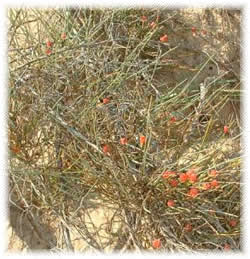|
|
|
|
| Common Names : Ma Huang |
| Actions: stimulant |
| Medicinal Uses:allergies, asthma |
| Parts Used: stems |
| Constituents:Alkaloids (including ephedrine, norephedrine, methyl ephedrine, pseudoephedrine), tannins, saponin, flavone, essential oil |
|

This native Chinese shrub grows to a little over two feet in height, almost leafless with minute, yellow green flowers. The species Ephedra sinica or Ma-Huang, is the most widely used and researched. Ma Huang has a 5,000 year history of use in Chinese medicine as an asthma treatment. The whole herb, which can still be purchased legally, is used to brew a tea.
The phytochemical ephedrine possesses properties similar to adrenaline that serves a critical role in our system as a neurotransmitter and a modulator of our metabolic rate. This powerful stimulant action is the major reason why it is so dangerous when misused. The effects of ephedrine on the brain and central nervous system is similar to, but weaker than that of amphetamine. Ephedrine has the ability to increase heart rate and work output and blood pressure. This stimulant action is the major reason for ephedra reputation as an aphrodisiac and the major reason why it is so dangerous. Ephedra has fallen into disfavor because of its misuse in the west as a diet drug. A handful of people have died over the last few years prompting the FDA to ban its use.
|
|
Preparation Methods :The stems of the ephedra plant can be brewed into a pungent, bitter, herb tea that dilates the bronchial vessels while stimulating the heart and central nervous system. Sometimes called Mormon Tea, this use of the whole plant form of ephedra remains legal.
|
|
 Buy Bulk Organic Ephedra Buy Bulk Organic Ephedra
|
| Side Effects: |
|---|
| The herb and its extracts are potentially addictive, and can disrupt regular heart rhythm, induce cardiac arrest, and raise blood pressure. They are very likely to make you sweat profusely, become irritable, nervous, nauseous and cause insomnia. |
|
|
|
|
|
|